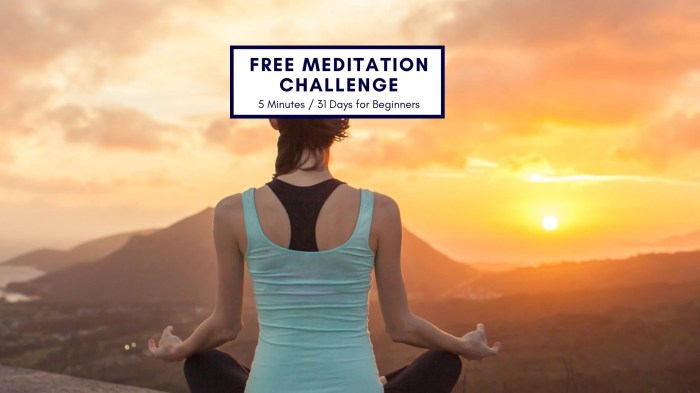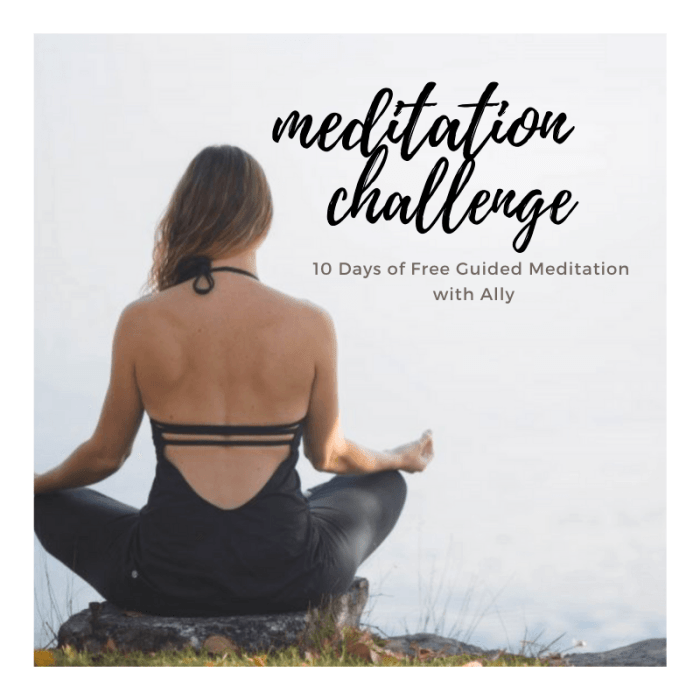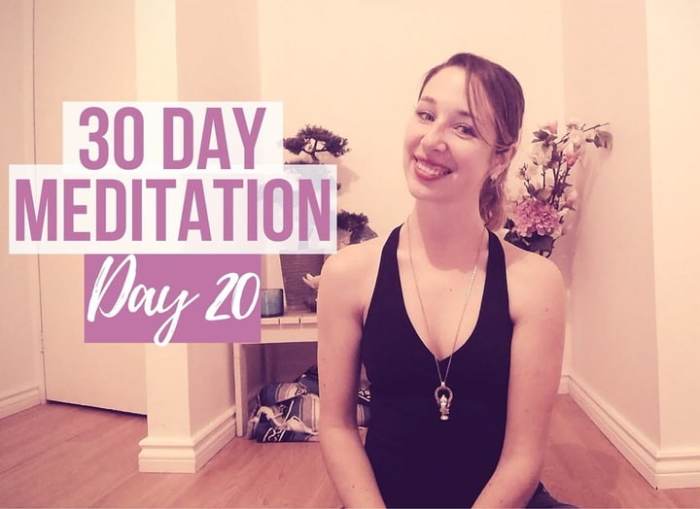With 20-Day Meditation Challenge for Beginners at the forefront, get ready to dive into a transformative journey of self-discovery and inner peace. As you uncover the power of meditation, you’ll unlock a world of calmness and clarity that awaits you each day for the next 20 days.
From creating your sacred meditation space to overcoming obstacles and tracking your progress, this challenge will guide you through every step with wisdom and encouragement. Are you ready to take the first step towards a more mindful and balanced life?
Introduction to the 20-Day Meditation Challenge
Meditation is a practice that involves focusing the mind and eliminating distractions to achieve a sense of calm and inner peace. It is a way to connect with oneself and cultivate mindfulness.
Purpose of a 20-Day Meditation Challenge, 20-Day Meditation Challenge for Beginners
Embarking on a 20-day meditation challenge serves as a structured way for beginners to establish a regular meditation practice. It allows individuals to gradually build their meditation skills and experience the benefits of consistent practice.
Benefits of Meditation for Beginners
- Improves focus and concentration
- Reduces stress and anxiety levels
- Promotes emotional well-being
- Enhances self-awareness
- Aids in better sleep quality
Getting Started with Meditation

Creating a conducive meditation space is essential for a successful practice. Find a quiet and peaceful area in your home where you can sit comfortably without distractions. Consider adding elements like cushions, candles, or plants to enhance the ambiance.
Tips for Creating a Conducive Meditation Space:
- Avoid clutter and keep the space clean and organized.
- Use natural light or soft lighting to create a calming atmosphere.
- Consider incorporating elements of nature, such as plants or natural materials.
- Personalize the space with items that hold special meaning to you.
Different Meditation Techniques for Beginners:
- Guided Meditation: Utilize apps like Headspace or Calm for guided meditation sessions led by experienced teachers.
- Mantra Meditation: Repeat a word or phrase silently to focus your mind and cultivate inner peace.
- Body Scan Meditation: Bring awareness to different parts of your body, releasing tension and promoting relaxation.
- Breath Awareness Meditation: Focus on your breath as it moves in and out of your body, promoting mindfulness and presence.
Recommended Resources for Support:
- Apps: Headspace, Calm, Insight Timer
- Guided Videos: YouTube channels like The Honest Guys, Jason Stephenson
- Books: “The Miracle of Mindfulness” by Thich Nhat Hanh, “Wherever You Go, There You Are” by Jon Kabat-Zinn
Setting Intentions and Goals

Setting intentions and goals for the 20-Day Meditation Challenge is crucial for staying focused and motivated throughout the journey. By establishing clear intentions, participants can have a sense of purpose and direction, making the practice more meaningful and effective.
Importance of Setting Intentions
Setting intentions helps to clarify what you hope to achieve through meditation. It provides a roadmap for your practice and keeps you accountable. When you have a clear intention, you are more likely to stay committed and see the benefits of meditation.
How to Establish Achievable Meditation Goals
- Start by reflecting on why you want to meditate. What are your reasons for joining the challenge?
- Set specific and measurable goals. For example, meditating for a certain amount of time each day or reducing stress and anxiety levels.
- Break down your goals into smaller, manageable steps. This will help you track your progress and stay motivated.
- Be realistic with your goals. Set yourself up for success by setting achievable targets.
Examples of Intentions or Goals
-
I intend to cultivate a sense of inner peace and calm through daily meditation practice.
-
My goal is to enhance my focus and concentration by meditating for 10 minutes every morning.
-
I aim to reduce stress and improve my overall well-being by incorporating mindfulness meditation into my daily routine.
Daily Routine and Schedule
Incorporating meditation into your daily routine is essential for the success of the 20-day challenge. Setting aside dedicated time for meditation can help you establish a consistent practice and experience the full benefits of this ancient technique.
Sample Daily Schedule
- 6:00 AM – Wake up and start the day with a 10-minute meditation session
- 7:00 AM – Have a healthy breakfast
- 12:00 PM – Lunch break with a short 5-minute meditation session
- 6:00 PM – Wind down the day with a 15-minute meditation session
- 10:00 PM – Prepare for sleep with a calming 10-minute meditation session
Ideal Times for Meditation Sessions
- Morning: Starting your day with meditation can set a positive tone for the rest of the day. Aim for a session upon waking up or before breakfast.
- Midday: Taking a break during the day for a short meditation session can help reset your focus and energy levels.
- Evening: Ending your day with meditation can help you relax, unwind, and prepare for a restful night’s sleep.
Tips for Integrating Meditation into Daily Routines
- Set reminders: Use alarms or notifications to remind you of your meditation sessions at designated times.
- Start small: Begin with shorter meditation sessions and gradually increase the duration as you become more comfortable with the practice.
- Create a sacred space: Designate a quiet and peaceful area in your home where you can meditate without distractions.
- Be flexible: If you miss a scheduled session, don’t be too hard on yourself. Simply resume the practice at the next available time slot.
Overcoming Challenges and Obstacles

As you progress through the 20-Day Meditation Challenge, you may encounter various obstacles that can hinder your practice. It’s essential to be prepared for these challenges and have strategies in place to overcome them.
Common Obstacles for Beginners
- Restlessness and wandering thoughts during meditation sessions.
- Difficulty in finding a quiet and uninterrupted space for practice.
- Lack of consistency in sticking to the daily meditation routine.
- Physical discomfort or pain while sitting for extended periods.
Strategies to Overcome Distractions
- Focus on your breath or a specific mantra to anchor your attention during meditation.
- Acknowledge distracting thoughts without judgment and gently guide your focus back to the present moment.
- Experiment with different meditation techniques to find what works best for you and keeps you engaged.
- Use guided meditation recordings or apps to maintain your focus and motivation.
Staying Motivated Throughout the Challenge
- Set realistic goals and intentions for your meditation practice to stay committed.
- Celebrate small victories and progress made during each session to boost your motivation.
- Connect with a meditation buddy or join a supportive community to share experiences and stay accountable.
- Remind yourself of the benefits of meditation, such as reduced stress, improved focus, and overall well-being, to stay motivated.
Tracking Progress and Reflecting: 20-Day Meditation Challenge For Beginners
Tracking your progress during the 20-Day Meditation Challenge is essential for monitoring your growth and staying motivated. Reflecting on your experiences allows you to gain insights and learnings that can enhance your meditation practice in the long run.
Importance of Tracking Progress
- Keeps you accountable and motivated to continue with the challenge.
- Helps you identify patterns or changes in your meditation practice over time.
- Allows you to celebrate small victories and milestones along the way.
Maintaining a Meditation Journal
- Set aside a few minutes each day to jot down your thoughts, feelings, and experiences after each meditation session.
- Include details such as the length of your meditation, any distractions you faced, and how you felt before and after the practice.
- Use your journal as a tool for self-reflection and growth in your meditation journey.
Reflecting on Experiences and Learnings
- Take time at the end of each day to reflect on how your meditation practice went, what you learned, and how you can improve.
- Ask yourself questions like “What worked well today?” and “What challenges did I face during meditation?”
- Use your reflections to make adjustments to your practice, set new goals, and continue evolving in your meditation journey.
Last Recap

As the 20-Day Meditation Challenge for Beginners comes to an end, reflect on the profound changes you’ve experienced in just a few weeks. Remember, meditation is not just a practice but a lifelong journey towards inner harmony and well-being. Keep exploring, keep meditating, and keep nurturing your mind, body, and soul.